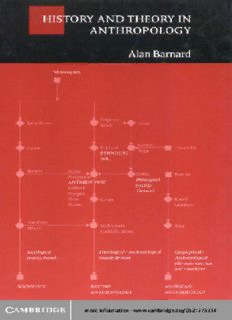
History and Theory in Anthropology PDF
Preview History and Theory in Anthropology
History and Theory in Anthropology Anthropology is a discipline very conscious of its history, and Alan Barnard has written a clear, balanced, and judicious textbook that surveys the historical contexts of the great debates in the discipline, tracing the genealogies of theories and schools of thought and con- sidering the problems involved in assessing these theories. The book covers the precursors of anthropology; evolutionism in all its guises; diVusionism and culture area theories, functionalism and structural- functionalism;action-centredtheories;processualandMarxistperspec- tives;themanyfacesofrelativism,structuralismandpost-structuralism; andrecentinterpretiveandpostmodernistviewpoints. alan barnardisReaderinSocialAnthropologyattheUniversityof Edinburgh.HispreviousbooksincludeResearchPracticesintheStudyof Kinship (with Anthony Good, 1984), Hunters and Herders of Southern Africa(1992),and,editedwithJonathanSpencer,EncyclopediaofSocial andCulturalAnthropology(1996). MMMM History and Theory in Anthropology Alan Barnard UniversityofEdinburgh The Pitt Building, Trumpington Street, Cambridge, United Kingdom The Edinburgh Building, Cambridge CB2 2RU, UK 40 West 20th Street, New York, NY 10011-4211, USA 477 Williamstown Road, Port Melbourne, VIC 3207, Australia Ruiz de Alarcón 13, 28014 Madrid, Spain Dock House, The Waterfront, Cape Town 8001, South Africa http://www.cambridge.org ©Alan Barnard 2004 First published in printed format 2000 ISBN 0-511-01616-6 eBook (netLibrary) ISBN 0-521-77333-4 hardback ISBN 0-521-77432-2 paperback For Joy MMMM Contents List of Wgures page viii List of tables ix Preface xi 1 Visions of anthropology 1 2 Precursors of the anthropological tradition 15 3 Changing perspectives on evolution 27 4 DiVusionist and culture-area theories 47 5 Functionalism and structural-functionalism 61 6 Action-centred, processual, and Marxist perspectives 80 7 From relativism to cognitive science 99 8 Structuralism, from linguistics to anthropology 120 9 Poststructuralists, feminists, and (other) mavericks 139 10 Interpretive and postmodernist approaches 158 11 Conclusions 178 Appendix 1: Dates of birth and death of individuals mentioned in the text 185 Appendix 2: Glossary 192 References 215 Index 236 vii Figures 5.1 The organic analogy: society is like an organism 63 5.2 Relations between kinship terminology and social facts 74 6.1 The liminal phase as both ‘A’ and ‘not A’ 87 6.2 Marital alliance between Kachin lineages 93 6.3 Relations between Kachin and their ancestral spirits 94 8.1 InXuences on Le´vi-Strauss until about 1960 126 8.2 Le´vi-Strauss’ classiWcation of kinship systems 129 8.3 The culinary triangle 131 8.4 Kin relations among characters in the Oedipus myth 133 9.1 The grid and group axes 153 9.2 The grid and group boxes 154 11.1 Three traditions 179 viii Tables 1.1 Diachronic, synchronic, and interactive perspectives 9 1.2 Perspectives on society and on culture 11 3.1 Evolution (Maine, Morgan, and others) versus revolution (Rousseau, Freud, Knight, and others.) 44 5.1 Malinowski’s seven basic needs and their cultural responses 69 7.1 Approximate correspondences between words for ‘tree’, ‘woods’, and ‘forest’ in Danish, German, and French 113 7.2 Two componential analyses of English consanguineal kin term usage 116 8.1 English voiced and unvoiced stops 124 8.2 Le´vi-Strauss’ analysis of the Oedipus myth 134 9.1 Bateson’s solution to a problem of national character 151 ix
Description: